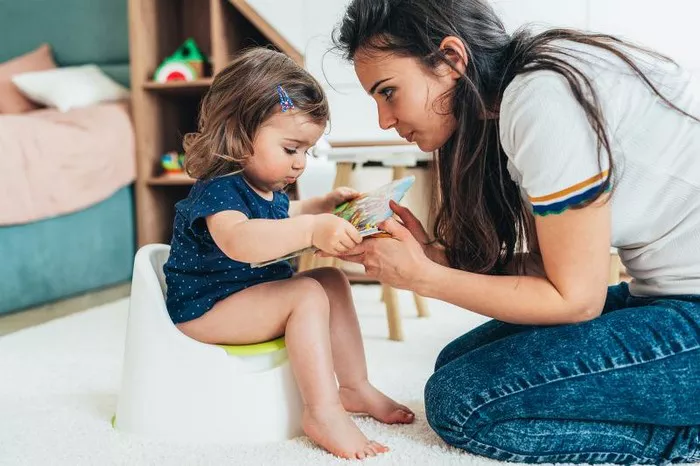Potty training is a significant milestone in a child’s development, marking a step towards greater independence and self-sufficiency. While daytime potty training often takes precedence in discussions and parenting guides, nighttime potty training presents its own set of challenges and considerations. Understanding the timeline and strategies involved can help parents navigate this journey with confidence and patience.
Understanding Nighttime Potty Training
Nighttime potty training, or night dryness, refers to a child’s ability to stay dry through the night without the need for diapers or pull-ups. Unlike daytime potty training, which involves learning to recognize and respond to the urge to use the toilet, nighttime training requires a child’s body to physically develop the ability to hold urine for extended periods or wake up when they need to go.
Factors Influencing the Duration of Night Potty Training
Age and Developmental Readiness: Most children achieve daytime dryness between ages 2 and 4, but nighttime dryness can take longer. Children’s bladders need to mature and their bodies must produce the right amount of antidiuretic hormone (ADH) to reduce urine production at night.
1. Genetics: Family history plays a role. If parents experienced late bedwetting, their children might also take longer to achieve nighttime dryness.
2. Bladder Size and Function: Some children may have smaller bladders or other physiological factors that affect their ability to stay dry at night.
3. Sleep Patterns: Deep sleepers might not wake up to the sensation of a full bladder, leading to accidents.
4. Diet and Fluid Intake: Excessive fluids, particularly close to bedtime, can influence nighttime wetting.
Typical Timeline for Night Potty Training
Nighttime potty training is a highly individual process, but general timelines can provide some guidance:
1. Early Starters (Under 3 Years Old): Some children achieve nighttime dryness soon after daytime training. However, this is less common.
2. Average Timeline (3-5 Years Old): Many children become dry at night within this age range, though it is normal for some to continue having occasional accidents.
3. Late Starters (5 Years and Older): Persistent bedwetting past the age of 5 is not uncommon and can still fall within the range of normal development. However, at this stage, parents might consider consulting a pediatrician to rule out any underlying issues.
Strategies for Successful Night Potty Training
While patience and understanding are key, several strategies can facilitate the process of nighttime potty training:
Establishing a Routine
1. Consistent Bedtime Routine: Create a calming pre-sleep routine that includes using the toilet right before bed. This routine can signal the body to reduce nighttime urination.
2. Limiting Evening Fluids: Reduce the amount of liquid your child consumes in the evening, especially close to bedtime. Be mindful of caffeinated or sugary drinks, which can increase urine production.
3. Use of Nighttime Diapers or Pull-Ups: Initially, continue using nighttime diapers or pull-ups to prevent disturbances from accidents. Gradually transition to underwear once you observe longer periods of dryness.
Creating a Supportive Environment
1. Easy Access to the Toilet: Ensure your child can easily reach the toilet at night. Consider using nightlights to illuminate the path.
2. Protecting the Bed: Use waterproof mattress covers to protect the bed and reduce the stress of cleaning up after accidents.
Encouraging Independence
1. Empower Your Child: Encourage your child to take responsibility for their toileting needs. Praise their efforts and progress, regardless of the outcome.
2. Positive Reinforcement: Reward systems, like stickers or small treats for dry nights, can motivate and reinforce positive behavior.
Handling Accidents with Care
1. Stay Calm and Supportive: React to accidents with understanding and reassurance. Avoid punishment or shaming, as this can create anxiety and hinder progress.
2. Involving Your Child in Cleanup: Have your child help with changing the sheets and cleaning up. This involvement can increase their awareness and sense of responsibility.
Monitoring Progress and Seeking Help
1. Track Patterns: Keep a record of dry nights and accidents. Identifying patterns can help in adjusting strategies.
2. Consulting a Pediatrician: If your child continues to struggle with nighttime dryness past age 5 or experiences significant stress or physical discomfort, seek medical advice to rule out underlying conditions such as urinary tract infections, sleep disorders, or constipation.
Addressing Common Concerns
Is Bedwetting Normal?
Yes, bedwetting (nocturnal enuresis) is common in young children. Up to 20% of 5-year-olds and 10% of 7-year-olds experience bedwetting. Most children outgrow it without intervention.
When to Worry?
While occasional accidents are normal, persistent bedwetting beyond age 7, especially if accompanied by daytime symptoms, might warrant further evaluation. Conditions like diabetes, urinary tract infections, or psychological factors could be contributing.
Coping with Setbacks
Setbacks are part of the process. Changes in routine, stress, or illness can cause regressions. Maintain a positive attitude and continue with supportive strategies.
Conclusion
Nighttime potty training is a journey that varies greatly from child to child. Understanding the factors that influence this process and employing effective strategies can make it a smoother experience for both parents and children. Remember, patience and support are crucial. While there is no fixed timeline, most children achieve nighttime dryness with time, practice, and encouragement. If concerns arise, consulting a pediatrician can provide additional guidance and reassurance.
By embracing the process with empathy and persistence, parents can help their children reach this important developmental milestone, fostering independence and confidence.


